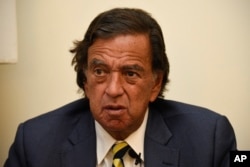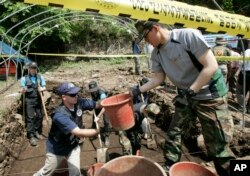Recovering the remains of U.S. soldiers killed during the Korean War could be complicated by restrictions under international sanctions, experts said, even though the White House is hailing the effort as "the momentum for positive change" in relations between the United States and North Korea.
Last week, North Korea returned 55 cases believed to contain the remains of fallen American soldiers as a part of an agreement made with the U.S. at the Singapore summit in June. A U.S. aircraft flew into Wonsan, a city on North Korea's east coast, to retrieve the remains and transfer them to Osan Air Base in Pyeongtaek, near Seoul.
The cases were transported to Hawaii on Wednesday where Vice President Mike Pence participated in a ceremonial reception for them at Joint Base Pearl Harbor-Hickam. Experts will conduct a series of forensic examinations on the remains to identify the dead.
The White House announced on July 26 that the U.S. will resume joint field operations in North Korea to recover the remains of fallen U.S. soldiers.
On Sunday, State Department spokesperson Heather Nauert said, "North Korea did not ask for money and no money was exchanged" for returning the 55 cases.
Concerns raised
However, some former U.S. officials and experts who were involved in recovery operations in the past raised concerns that North Korea could make excessive demands when the operations begin.
Bill Richardson, a former U.N. ambassador and New Mexico governor who secured the return of six sets of American remains in 2007, said North Korea will ask for payments of recovering the remains going forward.
"Eventually, they're going to want to get money for them," said Richardson, adding, "The North Koreans said they would do 200. And they're doing only 55 so they're dragging this out as they always do. They're going to do it in phases."
Better oversight needed
Paul Cole, an expert in prisoner of war and missing in action issues from the Korea War who served four years as a scientific fellow at the Pentagon's Central Identification Laboratory in Hawaii, said the payment process needs more transparency and oversight.
"The biggest difference between the payments that are made to Vietnam [for recovery and repatriation operations] and the payments that are made to North Korea is …the Vietnamese provide receipts, documentation," said Cole. "The payments that have been made to North Korea, there's never been receipts …never audited the payments to North Korea … never had any oversight hearings on the payments to North Korea."
Payment covers eight months of work
According to a document obtained by VOA's Korean Service, the U.S. agreed in 2011 to pay $5,699,160 for services North Korea was to provide in conducting joint field operations to recover American remains scheduled to begin in March 2012.
The "Record of Arrangement" that Deputy Assistant Secretary of Defense for POW/MIA Affairs Robert Newberry and Major General of Korean People's Army Pak Rim Su signed in October 2011 after having talks in Bangkok, lists a detailed description of joint field operations and a schedule for executing them.
The money was to cover eight months of recovery work, including four rounds of joint field activity in North Korea.
The document also lists supplies to be given North Korea.
"In the initial bulk supply shipment, the U.S. side intends to provide 72 tons of rice, 8.9 tons of vegetables, 26 tons of meat; 333,204 liters of gasoline; 100,000 liters of diesel fuel; 12,500 liters of kerosene; 7 tons of propane; 8,660 liters of lubricant; and other necessary supplies for the joint activities," the document states.
Cash payment could violate sanctions
An official with the Defense POW/MIA Accounting Agency (DPAA) insists "the U.S. government does not pay any government or individual for the remains of missing Americans." The official told the VOA Korean Service that the U.S. is "authorized to reimburse for the costs incurred with recovering and repatriating U.S. remains."
Sanctions experts note that cash payments and equipment could violate existing U.N. sanctions on North Korea.
William Brown, a former U.S. intelligence official, said Washington needs to seek exemptions on U.N. sanctions if payments and equipment will be sent to North Korea for recovery operations.
"There already are exemptions for diplomatic activities, but I'm pretty sure more exemptions will be needed for this to happen," said Brown. "But then, I doubt there would be much if any push back, either from U.N. Security Council or other U.S. administration entities. For example, the transfer of any money and shipment of equipment to the North Korean government would normally not be allowed."
Although the payments to compensate North Korea for the costs of recovery operations will not be considered a violation of sanctions, according to Jonathan Schanzer, a former Treasury Department official, equipment considered dual use would be of concern.
U.S. pays for recovery of soldiers
Since 1993, the Prisoner of War/Missing Personnel Office at the U.S. Department of Defense has paid North Korea nearly $28 million for its help in recovering the remains of U.S. servicemen unaccounted for during the Korean War. Most of the money was used to pay the cost of over 32 recovery operations conducted in North Korea since 1996, according to a Congressional Research Service report issued in 2005. Those operations have recovered over 220 probable U.S. remains.
In the latest round of recovery efforts, U.S. President Donald Trump thanked North Korean leader Kim Jong Un at the June summit in Singapore, tweeting, "Thank you to Chairman Kim Jong Un for keeping your word and starting the process of sending home the remains of our great and beloved missing fallen.
Of 36,000 U.S. soldiers who lost their lives in the Korean War that lasted from 1950 to 1953, 7,699 U.S. troops are listed as missing as of June 18 and 5,300 of the remains are believed to be in North Korea.















